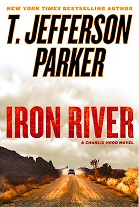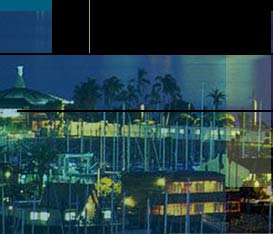
   

 




















|
|
|
 |
| US |
The car
hurtled west towing a swirl of black exhaust into the first light of day. It was
old and low, with Baja plates and a loose muffler that dangled and sparked on
the dips. The woman drove. She was silver-haired and fl at-faced and though her
eyes were open wide to gather the light, her face was still slack from sleep.
Her husband sat heavily beside her, boots spread and hat low, nodding slowly
through the rises and falls of the highway, a coffee cup riding on his thigh.
“Cansada,” she said. Tired. Then told him about
a dream she had had the night before: an enormous wave made of white lilies, a
blue sun, and a nice talk with Benito, thirty years dead, who told her to say
hello to his father.
Cansado, he thought.
He looked out. It was desert as far as he could see or
remember seeing. He worked on cars at the gas station in Bond’s Corner. She had
motel rooms to clean in Buenavista.
She told him about another dream she had had, and her
husband lifted the cup and sipped and set it back on his thigh and closed his
eyes.
The sun rose behind them. The woman checked its
progress in the rearview mirror. Something registered ahead and she dropped her
gaze back through the windshield to a young coyote sitting just off the shoulder
next to a paloverde. She had never seen a coyote sitting down. She wondered if
all her maids would show up today or she would have to clean a block of rooms
herself. The sore neck. The weak arm. She steered the car down a steep dip and
lifted her eyes to the mirror again. What did a wave of white lilies mean? In
her dream, Benito looked young and sweet, exactly as he had in life. Benito the
Beautiful. She was crossing herself as she neared the rise and still looking
back at the sun while thinking of him and when she looked ahead again, she saw
that she had drifted far into the oncoming lane. When she topped the rise, the
truck was barreling down on her, the grille shiny and looming and the windshield
a sun-forged plate of armor. Her husband cursed and reached for the wheel, but
she was still in her genuflection and his hand closed not on the wheel but on
her wrist so that she could use only her half crippled left hand to correct the
course of the big heavy Mercury.
She swung the wheel to the right with all her strength.
She felt the back end come around and the front end slide away and she clutched
the wheel with both hands now, and her husband was thrown against her, and orbs
of his coffee wobbled in space but he held the wheel, too, and the truck
thundered by with a sucking howl. The sedan broke loose from the pull and spun
twice quickly and she was so utterly dazed by the force that when she saw the
man crouching on the right shoulder by his pickup, she had no idea which way to
turn the wheel in order to miss him. Then it was too late anyway. She saw the
long hood of the car sweep across him and she felt the sharp impact, but the
Mercury kept spinning and when it finally
ground sideways through the gravel to a stop, she had no idea how she had missed
the pickup, or where the dead man had landed.
She threw the shift into park. They sat for a moment,
breathing hard, hearts pounding, dust rising around them in the sudden silence.
She looked west down the highway and saw nothing but road, and when she looked
behind them she saw the pickup truck and the rise far behind it.
“Dios,” she whispered.
The man looked hard at his wife then pulled the keys
from the ignition and tried to brush the coffee from his new jeans. He pushed
open the door and stepped into the morning.
It took them a few minutes to find the dead man
sprawled back in the desert on the white sand between clumps of yucca. He was a
gringo. He was small. His face was covered in blood and his body was misshapen.
He wore the same kind of clothes she saw at Wal-Mart. He had a watch but no
rings.
“Don’t touch him, he’s alive,” said her husband.
The man’s breath whistled in and out, and a tooth moved
in his
broken mouth. Then for a long time nothing. Then he breathed
again.
She crossed herself and knelt beside him. Her husband
looked around them, then back at the sun just above the horizon now. She asked
God and Ignacio what to do with such a broken body. She said there was the
hospital in Buenavista, famous doctors who treated important people.
“Go away,” whispered the dead man. He opened his eyes.
They were blue beneath the blood. “Please.”
“You will die,” she said.
The man was silent for a long moment during which he
did not breathe. Then another breath, this one deeper, followed by another. The
tooth moved and the air whistled in and out.
The husband said they would be arrested and deported,
so if this man wanted them to go away, then they would.
She looked up at him. “No. We drive to the hospital. We
tell them where he is.”
“Tell them. Nothing,” whispered the gringo. His eyes
looked malevolent,
but the woman thought that any eyes would look that way in a face so ruined and
bloody.
“We have a duty to God,” she said.
The gringo drew a long breath, then he raised his hand
very slightly from the sand, and he pointed his index finger at her, then curled
it toward himself.
She shuddered.
He curled the finger again, then lowered his hand back
to the ground. He was watching her.
Maria Consalvo Reina Villalobos stared into the blue
eyes. She looked at the broken, doll-like body. And she knew that if they were
to leave the gringo here and drive away and not say one thing, then he would die
and his blood would be on her hands twice—once for thinking of waves of lilies
and her beloved son Benito, and once for not telling anyone that there was a man
dying in the desert not ten miles from town.
She leaned in closer. She saw him watching her through
the blood. His broken tooth whistled again. She sensed Ignacio hovering behind
her. The little man said something that she couldn’t hear, so she leaned even
closer.
“Señora y señor,” the gringo whispered. “In the
name of Benito the Beautiful, tell them nothing.”
Maria Consalvo scrambled to her feet, hitting at
herself as if she were being attacked by hornets. Ignacio stood tall and glared
down at the gringo who called his dead son by name. He saw a boulder of quartz
lying just beyond the yucca, a single boulder, as if dropped there for a
purpose.
He took his wife by the arm and led her away. Ignacio
knew that the man would probably be dead before the heat of afternoon, and
certainly dead after it. He brought his wife to the passenger side of the
Mercury and he opened the door for her and steadied her as she spilled into the
cracked vinyl seat.
They were silent until Buenavista. As they entered the
little border town, they agreed to say nothing to the authorities. They passed
the zocalo and St. Cecilia’s church and the Rite Aid and the Denny’s. At the
Ocotillo Lodge, Ignacio left the Mercury idling while he opened his wife’s door
and kissed her formally before he drove off for Bond’s Corner. He had not opened
her door or kissed her before work in twenty-four years.
Within five minutes Maria’s conscience prevailed and
she called the Buenavista police station and told them about the man in the
desert. She gave a good location based on the gringo’s pickup truck.
She hung up when the deep-voiced policeman asked her name. She knew that voice:
Gabriel Reyes, chief of Buenavista’s police force. Reyes ate breakfast alone at
the Ocotillo on Thursdays, his uniform crisp, his face sad.
Ignacio called no one. When he got to work, his gringo
boss walked him to the far part of the lot and lifted the tarp from a GM Yukon
peppered with bullet holes. He told Ignacio it was muy importante,
número uno. Fine, thought Ignacio. He preferred narcotraficantes to
tiny devils any day.
Not long after Maria and Ignacio had left the man, the tractor trailer that
had nearly obliterated them arrived back on the scene of the near disaster. It
had taken the driver two miles to still his nerves and face down his fears and
make the laborious two-lane turnaround. He pulled off the road just behind the
pickup truck. From his elevated position in the cab, he could see the big skid
marks. He surveyed the desert around him and saw nothing unusual. There had been
a man working on a flat tire. Then the Mercury coming at him in his own lane.
He got out and walked over to the pickup and saw the
blown tire and the jack resting in the sand. The keys were still in the ignition
and the driver’s window was down. He reached in and honked the horn and waited.
A moment later he walked out into the desert beyond the pickup, but not far.
Rattlesnakes liked the cool mornings this time of year. He’d run over one last
spring not far from here that reached almost all the way across his lane, then
he’d taken the time to turn around on the narrow highway and run over it again.
He called out, and a jackrabbit bolted and his heart raced. A minute later he
climbed back into the Freightliner and continued on toward Yuma. No good came in
this desert.
Reyes looked at the skid marks, then up at the sun, then he followed the
footprints that led into the desert. There were two sets. One was made by cowboy
boots that left deep heel marks in the sand. The other was smaller and lighter
and could have been pretty much any kind of shoe. The woman, he thought.
The tracks ended and Reyes found blood and a slight
indentation
where someone had rested. Apparently rested. The two tracks turned
back toward the highway. But a third set of footprints, smaller than
the boots but heavier than the shoes, continued away from this
bloody lie into the desert beyond.
Reyes had no trouble following them. Half a mile to the
north in the foothills that would later offer shade, he found a bloody little
man half dug into an old den beneath a honey mesquite, legs protruding. Reyes
knelt and saw the glint of an eye back in the darkness, and he reached down and
lightly touched the man’s leg and told him he would be okay. Then he stood and
on his third try was able to place a cell call to Imperial Mercy for an
ambulance. Procedure was to call county first, but Reyes figured this guy would
be dead if he had to wait for paramedics out of El Centro.
“They’re on the way,” he said.
The man groaned.
© T. Jefferson Parker

|
 |
 |





